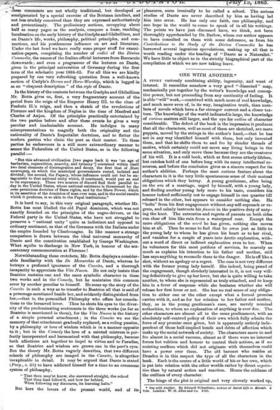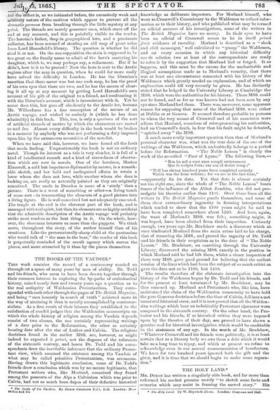ONE WITH ANOTHER.*
A STORY curiously combining ability, ingenuity, and want of interest. It resembles somehow a very good " dissected " map, mechanically put together by the writer's knowledge and concep- tive power, but not proceeding from any continuity of feeling. It is able " will" work,—contrived with much more of real knowledge, and much more even of, in its way, imaginative truth, than num- bers of novels which have a far stronger current and a closer tex- ture. The knowledge of the world indicated is large, the knowledge of curious matters still larger, and the eye for outline of character considerable. The defect of the book is the impression it produces that all the characters, well as most of them are sketched, are mere puppets, moved by the strings in the author's hand,—that he has not in any way identified himself with them, but only invented them, and that he shifts them to and fro by slender threads of motive, which certainly could not move any living beings in the same situation, and only move these because they are the creatures of his will. It is a cold book, which at first seems utterly lifeless, but catches hold of one before long with its many intellectual re- sources, and before the conclusion gives us a sincere respect for its author's abilities. Perhaps the most curious feature about the characters in it is the very little spontaneous sense of their mutual obligations which they betray. A young gentleman, after being on the eve of a marriage, urged by himself, with a young lady, and finding another young lady more to his taste, considers his honour indeed sufficiently not to engage himself in one quarter till released in the other, but appears to consider nothing else. He "bolts" from his first engagement without any self-reproach or re- grets, and calmly instructs his _fiancée in the positive duty of unty- ing the knot. The entreaties and regrets of parents on both sides run clear off him like rain from a waterproof coat. Except the mere obligations of the word he has given, nothing else moves him at all. Then he seems to feel that he owes just as little to the young lady to whom he has given his heart as to her rival, and vanishes for a couple of years into Arctic exploration, with- out a word of direct or indirect explanation even to her. When he volunteers for this most perilous of services, he scarcely so much as explains his intention to his father and mother, still less says anything to reconcile them to the danger. He is off like a shot, without an apology or a regret. The case is not very different with the former young lady herself. She indeed, being proud of the engagement, though slenderly interested in it, is not very will- ing definitively to give up her lover, but she is quite willing to take another, to whom she is represented as truly attached, and to keep him in a fever of suspense while she hesitates whether she will release her first lover or not. She has no real sense of any obliga- tion to either one or the other except what a formal promise carries with it, and as for her relation to her father and mother, they, as in the young gentleman's case, are merely nominal authorities, to whom no explanation of anything is ever due. The other characters are almost all in the same predicament, with an absolutely self-centred policy of their own which fully admits the force of any promise once given, but is apparently entirely inde- pendent of those half-implied bonds and debts of affection which make up the social network of society. The characters move to and fro almost in a social vacuum, almost as if there were no internal forces but volition and honour to control their actions, as if no resisting medium which did not originate with themselves could have a power over them. The old baronet who resides at Dresden is in this respect the type of all the characters in the book. Each is the centre of a little world of his or her own, which is put into relation with the other worlds rather by direct negotia- tion than by natural action and reaction. Hence the coldness of the outlines of every character.
The hinge of the plot is original and very cleverly worked up,
• One with Another. By Edward Wilberforce, Author of Social We in Munich. 2 vole. London: W. H. Allen and Co. 1e65.
but the Ffeet is, as we intimated before, the excessively weak and arbitrar* nature of the motives which appear to prevent all the dramatis persona from breaking through the little mystery at any point. The threads are merely gossamer ones, which stave off the end at any moment, and this is painfully visible to the reader. The heroine's father, deep in geographical lore, and a passionate collector, has been accused of stealing an old map of great value from Lord Haresfield's library. The question is whether he did steal it or not. On the one supposition the stain is supposed to be too great on the family name to admit of the hero's marrying his daughter, which is, we may perhaps say, a refinement. But if he didn't, how is it to be proved? Now the hero is sent to the Arctic regions after the map in question, when he could far more easily have solved the difficulty in London. He has the librarian's assertion that there never was but one such map, he has the proof of his own eyes that there are two, and he has the means of clear- ing it all up at any moment by getting Lord Haresfield's own account of his gift of the original to a friend, and confronting it with the librarian's account, which is inconsistent with it. Yet he never does this, but goes off obediently to the Arctic ice, because Mr. Wilberforce has a fine conception of the nature of an Arctic voyage, and wished to embody it (which he has done admirably) in this book. This, too, is only a specimen of the sort of artificial threads of motive by which the characters are moved to and fro. Almost every difficulty in the book would be broken in a moment by anybody who was not performing a duty imposed upon him by the extraneous necessities of the novelist.
When we have said this, however, we have found all the fault that needs finding.' Unquestionably the book is not an ordinary novel. Though its interest as a tale is very slender, it is full of a kind of intellectual remark and a kind of shrewdness of observa- tion which are rare in novels. One of the heroines, Marion Elmswell, a cold but impetuous diplomatist by nature, is a remark- able sketch; and her bold and undisguised efforts to retain a lover whom she does not love, while another whom she does is looking on, are really as naturally painted as they are originally conceived. The uncle in Dresden is more of a ' study ' than a picture. There is a want of something or other—a living touch of some sort—in transmuting the elements of a good picture into a living figure. Ile is well conceived but not adequately executed. The tangle at the end is the cleverest part of the book, and is managed with real spirit, but then its elements are so highly artificial that the admirable description of the Arctic voyage will probably strike most readers as the best thing in it. On the whole, how- ever, the showman interests us more than the puppets. We think more, throughout the story, of the author himself than of his creations. Like the preternaturally-sharp child at the pantomime who would talk of " the man in the bear," the reader of this book is perpetually reminded of the occult agency which moves the pieces, and more attracted by it than by the pieces themselves.































 Previous page
Previous page